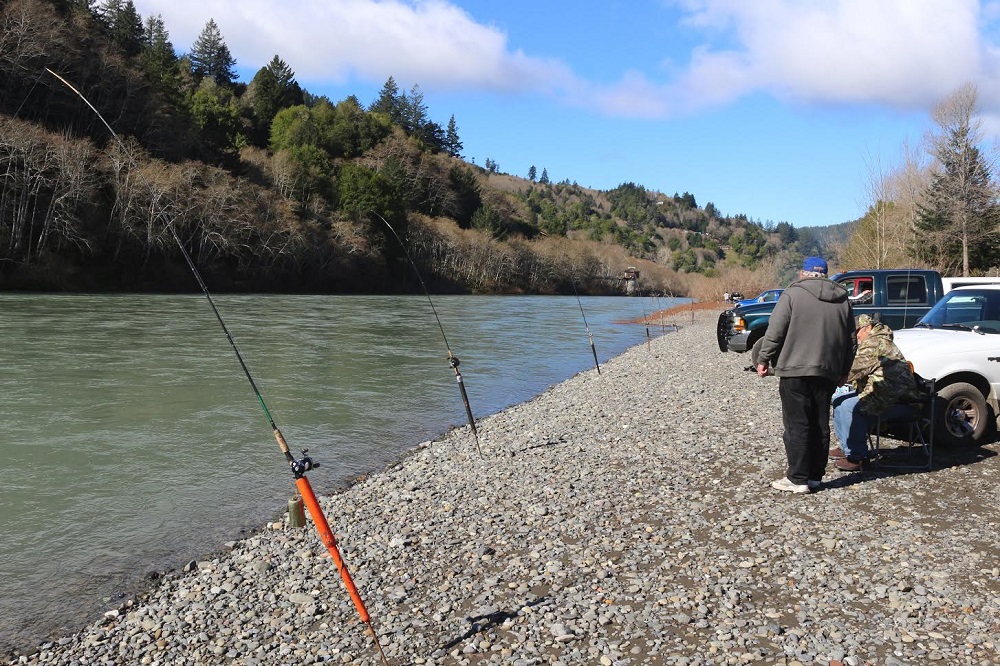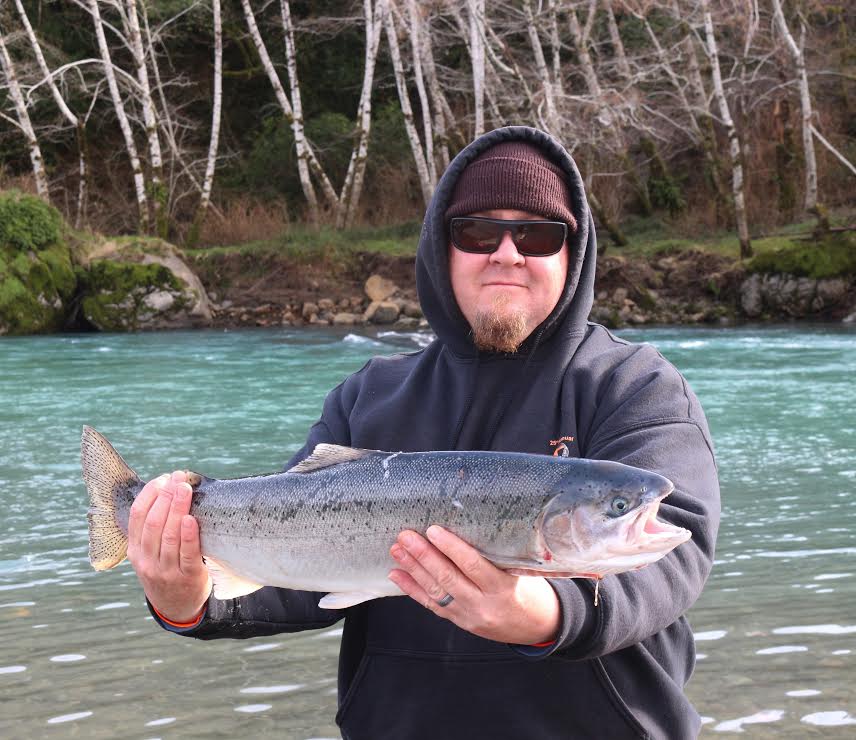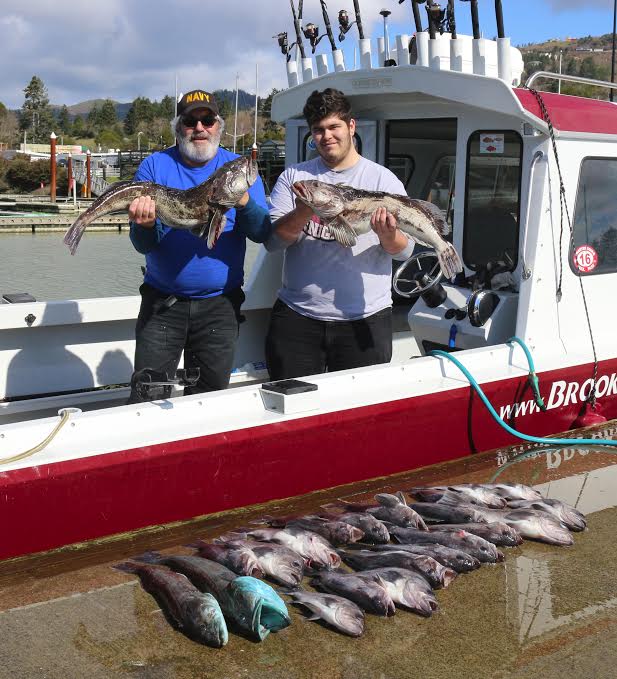Mexican Fish Report
Richard Heap attempts to eke out Brookings Ocean Salmon Season

by Larry Ellis
3-11-2017
Website
Richard Heap is currently at a PFMC meeting in Vancouver, Washington, fighting for whatever ocean salmon season he can scrounge out for the Oregon Klamath Management Zone (Oregon KMZ) which includes the Port of Brookings Harbor and spans from the California/Oregon border up to Humbug Mountain. Unfortunately, due to two specific rivers' salmon that are swimming in the ocean, the season is looking bleak at best. And I'm being optimistic.
This year, the Salmon Technical Team, or STT, has estimated that 230,700 Sacramento River Fall Chinook (SRFC) will make up the 3-, 4- 5- and 6-year old kings that are predicted to be swimming in the ocean.
It is the third lowest projection of fall Chinook in 11 years, including the horrific collapse of 2008 when 66,000 spawners wheel-chaired their way back up the Sacramento. So at this point in time, a 230,700 projection of SRFC doesn't sound all that bad.
And I would continue to be fairly optimistic about this year's salmon season if those SRFC figures applied to the Klamath Management Zones of Oregon and California.
But unfortunately this year, fishermen still have to impact Klamath River Fall Chinook in order to get to the Sacramento River's fish, and this year, it's the Klamath's fish that are the constraining factor for the entire fishery in both Klamath Management Zones. In fact, there has even been talk about no salmon seasons in the KMZ at all. The Klamath is only anticipated to have 54,200 fish finning their way through the ocean this year.
"The Sacramento stocks of fall Chinook are not good, but they are certainly not as bad as the Klamath, which is the lowest on record," says Heap, the Oregon Sportfishing Representative on the PFMC Salmon Advisory Sub-panel. Heap also serves as Vice Chair for the panel.
"We're fishing a de minimus fishery this year," Heap remarks about the Klamath Chinook. "We will be fishing well below the escapement requirement just to get to the Sacramento fish. So if we keep doing that, over time that ultimately sets us up for being in an over-fished status."
So when Heap made the statement last week that the salmon season could be from Memorial Day through June-ish, he wasn't just talking about when opening day was going to occur - he was talking about the entire season.
"That could mean the whole season," noted Heap. "The entire season could be as short as 15 to 20 days. So if we could squeeze out some opportunity and not have a closed season, I would be anxious to do that."
Heap noted that the first time folks generally start catching salmon on average is the third week in May, which this year, as always, coincides with Memorial Day. The Klamath impacts during that last week in May are generally null in the Oregon KMZ, so having a season opener during that time doesn't impact Klamath stocks of fish, or fishermen one bit.
"We have no Klamath impacts in May, so we get those days free," he remarked. "Then when we roll into June, our Klamath impacts are pretty low, so usually June can work out pretty good. But once you start getting into July, for us (the Oregon KMZ and the Brookings area), the Klamath impacts go up, and they're the highest in August."
Heap is trying to eke out as many days of Chinook fishing that he can, and in the process, he is considering not asking for a coho fishery for the Oregon KMZ, the reason being - more coho trips mean more Chinook salmon opportunity will occur, and he's trying to add up as many Chinook days this season as possible.
"If we have coho fishing, then the model figures that the participation will be heavier, so our impact rates for months when we have Chinook and coho open are higher than if we just have Chinook open," explains Heap. "So if it looks like fishing within the coho fishery in conjunction with the north-of-humbug fishery is too expensive, I will ask to not fish for coho, and we'll just build as many Chinook days as we can."
As of Friday afternoon, the three salmon options were still up in the air and were not going to be published until Monday. So to keep apprized of the latest developments, visit www.pcouncil.org.
It is my personal hunch that any options that have any chance of impacting Klamath River fish at all will not be considered by the PFMC. So I would not be surprised one bit if the Oregon KMZ season, if any, will only occur during the month of May, when the least amount of impacts to Klamath River fish occurs. I hope I'm wrong. We will have to wait and see come Monday.
Tight lines!
Larry Ellis, author, writer, columnist and photographer has had a 50-year passion for fishing in California and Oregon's saltwater and freshwater venues. He is a well-known writer for Oregon, Washington and California Fishing and Hunting News, Northwest Sportsman, California Sportsman and Pacific Coast Sportfishing. He currently writes monthly for Salmon Trout Steelheader Magazine, and is the author of two books, "Plug Fishing for Salmon" and "Buoy 10, the World's Largest Salmon Run." Both books can be bought from Amato Publications (amatobooks.com), Amazon and eBay. Ellis particularly loves living in his hometown of Brookings, Oregon - The heart of salmon country and gateway to fishing paradise.
More Reports

3-4-2017
What is undoubtedly the most-important meeting of the Pacific Fishery Management Council (PFMC) regarding ocean groundfish, Pacific halibut and salmon...... Read More

2-25-2017
The Oregon Department of Fish and Wildlife always hopes to achieve their goal of taking 120 winter steelhead from the...... Read More
